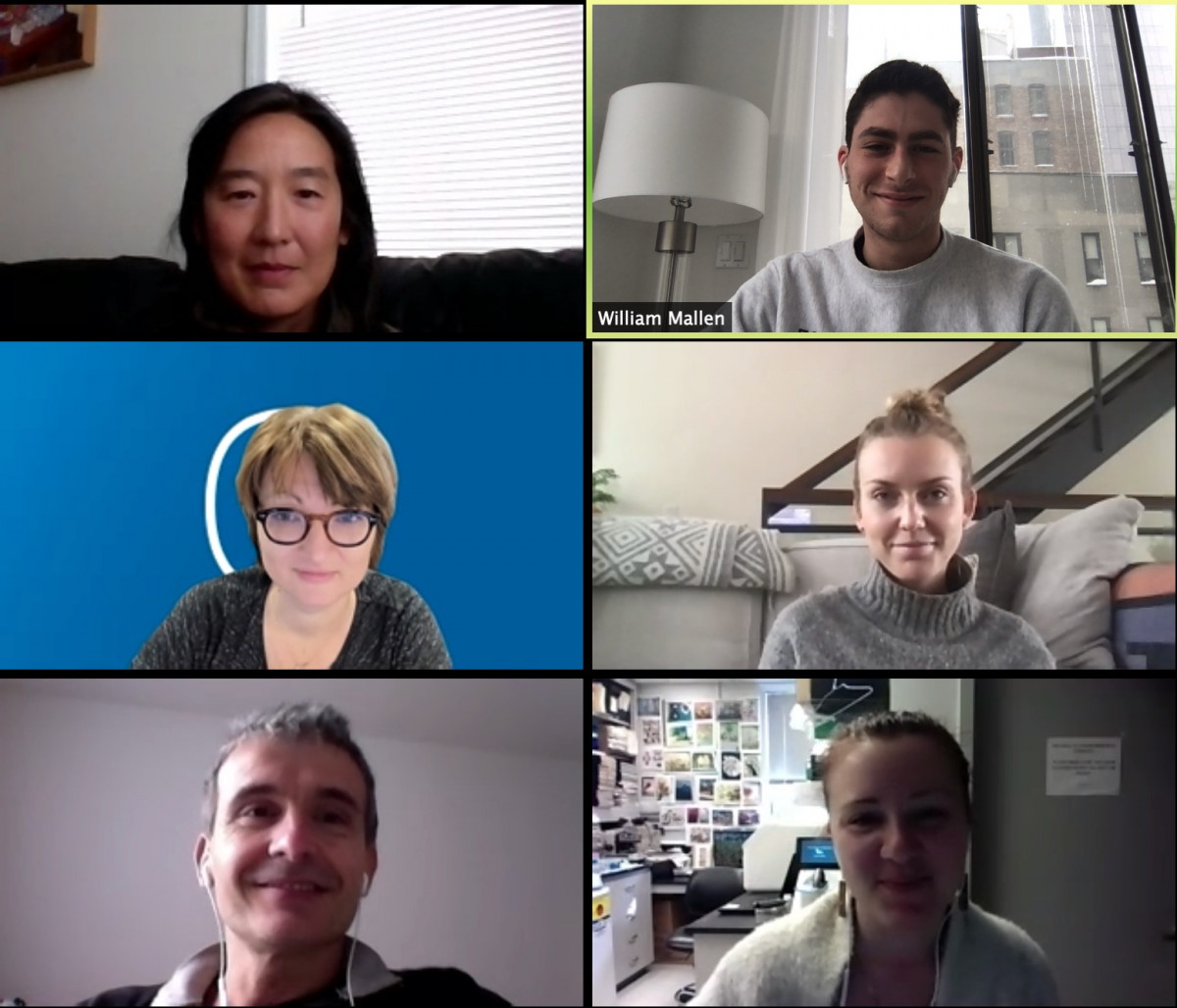The Cristina Antonescu Lab
Research

An on-going focus of our work is the genomic investigation of pediatric and young adult unclassified mesenchymal tumors, with a special emphasis on detecting novel gene fusions drivers. By applying highly efficient RNAseq and FusionSeq pipelines for novel translocation discovery in tumors that lack known genetic alterations, we are able to identify potential new gene rearrangements. After validation with custom designed BAC probes, the fusion candidates are screened in additional sarcoma samples with similar characteristics to establish their recurrent potential. If these gene fusions correlate with unique morphologic, immunophenotypic and clinical findings, then it is likely to define new, stand-alone pathologic entities. These validated fusions are then used as biomarkers of disease and incorporated as diagnostic molecular tests.
A subset of gene fusions characterized by our lab is then selected for in vitro translocation engineering. In addition to establish preclinical models for sarcomas, our work also investigates the pathogenetic mechanisms of gene fusion promiscuity in human neoplasia, specifically how identical translocations expressed in various cell lineages and/or at differentiation stages, with or without cooperating secondary genetic events, result in a wide spectrum of neoplastic disorders.
As the spectrum of tumors driven by these fusions include multiple lines of differentiation, we selected human embryonic stem (hES) cells as an optimal system for in vitro translocation engineering. Our approach uses an innovative and step-wise approach combining CRISPR-Cas9 technology with homology-directed repair (HDR) in the hES cellular context, followed by differentiation to an appropriate cell type [hES-derived mesenchymal precursor (hES-MP) or neural crest (hES-NC)], and conditional expression of the fusion gene from its endogenous locus.
My sarcoma research laboratory is dedicated to the detection and molecular characterization of diagnostic and prognostic markers in soft tissue sarcomas. Our current research is focused on 4 areas: (1) KIT oncogenic signaling in the pathogenesis of GIST and mechanisms of drug resistance to targeted kinase inhibitor therapies; (2) oncogenic signaling in angiosarcoma, with the characterization of KDR (VEGFR2) activating mutations in breast angiosarcoma and MYC/FLT4 gene amplifications in radiation-associated angiosarcoma; (3) fusion gene discovery and fusion transcript characterization in diagnosis and prognosis of soft tissue tumors; and (4) establishing genetically engineered sarcoma models using CRISPR-cas9 methodology for investigating the step-wise pathogenesis of translocation-associated sarcomas and generate faithful preclinical models for in vitro drug testing.

Publications Highlights
Antonescu CR, Agaram NP, Sung YS, Zhang L, Swanson D, Dickson BC. (2018). A distinct malignant epithelioid neoplasm with GLI1 gene rearrangements, frequent S100 protein expression, and metastatic potential: expanding the spectrum of pathologic entities with ACTB/MALAT1/PTCH1-GLI1 fusions. Am J Surg Pathol.; 42:553-560.
Rosenbaum E, Jadeja B, Xu B, Zhang L, Agaram NP, Travis W, Singer S, Tap WD, Antonescu CR. (2020). Prognostic stratification of clinical and molecular epithelioid hemangioendothelioma subsets. Mod Pathol.; 33:591-602
Antonescu CR, Kao YC, Xu B, Fujisawa Y, Chung C, Fletcher CDM, Graf N, Suurmeijer AJ, Zin A, Wexler LH, Ferrari A, Bisogno G, Alaggio R. (2020) Undifferentiated round cell sarcoma with BCOR internal tandem duplications (ITD) or YWHAE fusions: a clinicopathologic and molecular study. Mod Pathol.; 33:1669-1677.
Kao YC, Suurmeijer AJH, Argani P, Dickson BC, Zhang L, Sung YS, Agaram NP, Fletcher CDM, Antonescu CR. (2020). Soft tissue tumors characterized by a wide spectrum of kinase fusions share a lipofibromatosis-like neural tumor pattern. Genes Chromosomes Cancer.; 59: 575-583
Argani P, Harvey I, Nielsen GP, Takano A, Suurmeijer AJH, Voltaggio L, Zhang L, Sung YS, Stenzinger A, Mechtersheimer G, Dickson BC, Antonescu CR. (2020). EWSR1/FUS-CREB fusions define a distinctive malignant epithelioid neoplasm with predilection for mesothelial-lined cavities. Mod Pathol.; 33:2233-2243.
People

Cristina R. Antonescu, MD
Director, Soft Tissue and Bone Pathology
- The Antonsecu lab focuses on translocation-associated sarcoma pathogenesis and generating in vitro models.
- MD, Carol Davila Faculty of Medicine and Pharmacy
- [email protected]
- Email Address
- 212-639-5721
- Office Phone
Members

















Achievements
- SPORE in Soft Tissue Sarcoma - Novel therapeutics development and mechanisms of therapeutic resistance in gastrointestinal stromal (2018-2023)
- EHE Foundation - Molecular and Immune Characterization of EHE Clinical Subtypes (2019-2021)
- Cycle for Survival - Investigating the Molecular Mechanisms of EWSR1 CREB Gene Fusions in Driving Neoplastic Phenotype across Cell Lineages and Risk of Malignancy (2018-2021)
Open Positions
To learn more about available postdoctoral opportunities, please visit our Career Center
To learn more about compensation and benefits for postdoctoral researchers at MSK, please visit Resources for Postdocs
Get in Touch
-
Lab Head Email
-
Office Phone
-
Office Fax
-
Lab Phone
Disclosures
Members of the MSK Community often work with pharmaceutical, device, biotechnology, and life sciences companies, and other organizations outside of MSK, to find safe and effective cancer treatments, to improve patient care, and to educate the health care community. These activities outside of MSK further our mission, provide productive collaborations, and promote the practical application of scientific discoveries.
MSK requires doctors, faculty members, and leaders to report (“disclose”) the relationships and financial interests they have with external entities. As a commitment to transparency with our community, we make that information available to the public. Not all disclosed interests and relationships present conflicts of interest. MSK reviews all disclosed interests and relationships to assess whether a conflict of interest exists and whether formal COI management is needed.
Cristina R. Antonescu discloses the following relationships and financial interests:
No disclosures meeting criteria for time period
The information published here is a complement to other publicly reported data and is for a specific annual disclosure period. There may be differences between information on this and other public sites as a result of different reporting periods and/or the various ways relationships and financial interests are categorized by organizations that publish such data.
This page and data include information for a specific MSK annual disclosure period (January 1, 2024 through disclosure submission in spring 2025). This data reflects interests that may or may not still exist. This data is updated annually.
Learn more about MSK’s COI policies here. For questions regarding MSK’s COI-related policies and procedures, email MSK’s Compliance Office at [email protected].